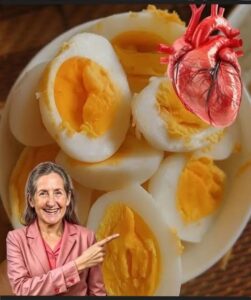🥚 Cracking the Egg Myth: What Really Happens When You Eat Eggs Every Day

For years, eggs were cast as the villains of the breakfast table. Back in the 1980s and 1990s, doctors and health agencies warned that their cholesterol-rich yolks were a shortcut to clogged arteries and heart disease. As a result, many people cut down drastically, swapping their morning scramble for “cholesterol-free” egg substitutes and low-fat alternatives. What was once a beloved staple suddenly became a food to fear.
But nutrition research has since flipped that old advice on its head. Modern science shows that dietary cholesterol doesn’t directly translate to high blood cholesterol for most people. Instead, the real threats to heart health are trans fats, refined carbs, and added sugars—not eggs. This revelation helped eggs regain their rightful place on our plates, proving they were never the enemy in the first place.
Cholesterol Concerns Debunked
A single egg yolk holds about 186 milligrams of cholesterol, which once seemed alarming. Yet, large-scale studies confirm that moderate egg consumption does not raise heart disease risk in healthy individuals. Only people with rare genetic conditions (like familial hypercholesterolemia) or those advised by doctors to avoid cholesterol need to be cautious. For everyone else, eating one or two eggs a day is not just safe—it can actually support better health.
A Nutrient Powerhouse
Eggs pack an impressive punch in a small shell. They’re one of the few foods considered a “complete protein,” containing all nine essential amino acids your body needs to build and repair tissues. Each egg also delivers a wide range of vitamins and minerals: vitamin A for vision, vitamin D for bone health, vitamin E for immunity, vitamin B12 for energy, plus selenium, folate, phosphorus, and iodine. Few foods offer such a balanced and concentrated source of nutrition at such a low cost.
The Brain and Eye Connection
One standout nutrient in eggs is choline—a critical compound for memory, nerve signaling, and fetal development. Expecting mothers especially benefit from choline, since it supports healthy brain growth in babies. Eggs also shine when it comes to eye health. Rich in antioxidants like lutein and zeaxanthin, they help protect against cataracts and age-related macular degeneration.
Weight Loss and Satiety
Despite their richness, eggs are surprisingly low in calories—around 70 per large egg. Because they’re protein-dense, they keep you full for longer than carb-heavy breakfasts. Studies show that people who eat eggs in the morning tend to consume fewer calories throughout the day compared to those who start with cereal, toast, or bagels. That makes eggs a natural ally in weight management.
Heart and Immune Support
Far from harming the heart, eggs actually provide nutrients that benefit cardiovascular function. Pasture-raised eggs often contain more omega-3 fatty acids and vitamin D, boosting both heart and immune health. When eaten as part of a balanced diet, they become an asset rather than a liability.
Affordable, Accessible, and Versatile
Part of what makes eggs a universal favorite is their versatility. You can fry them, boil them, poach them, scramble them, or bake them into countless dishes—from hearty frittatas to delicate custards. They’re just as at home in a salad as they are in a cake. Add their affordability and long shelf life, and it’s no wonder eggs remain a global staple.
The Bottom Line
Eggs have come full circle—from feared to celebrated. Once labeled as dietary troublemakers, they’re now recognized as one of the most nutrient-dense foods available. For most people, eating eggs daily is not only safe but also an easy way to boost overall health. Whether you enjoy them sunny-side-up in the morning or folded into your favorite dinner dish, eggs deserve their reputation as nature’s multivitamin in a shell.